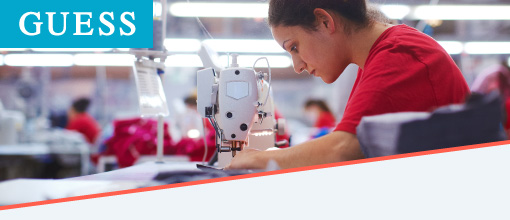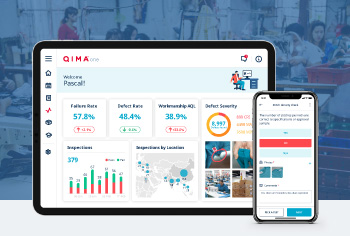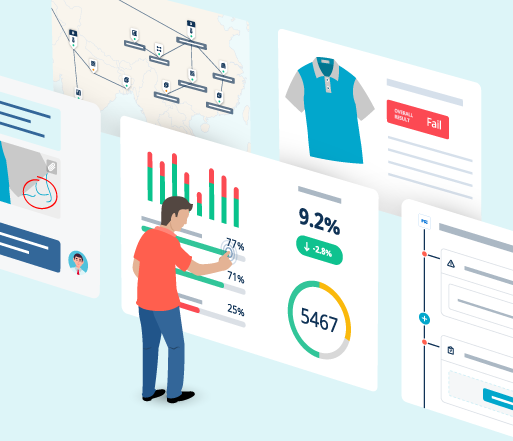
Article
How to Respond to Fast Fashion Trends with Quality and Compliance Software

Article
How to Respond to Fast Fashion Trends with Quality and Compliance Software
Article
How to Respond to Fast Fashion Trends with Quality and Compliance Software

Keep up-to-date with the latest supply chain insights.
Though the minds and motivations of apparel customers may sometimes be as hard to predict as the weather, some trends have evolved over the last twelve months that can guide our decisions for the next year.
We see current retail trends moving along two tracks. In the first track, we see trends that describe consumer behavior—what’s moving consumers to make the purchases they do. Along the second track, retailers’ trends highlight what strategies are being used to help move goods. Let’s take a look.
More sustainable apparel suppliers/sourcing
Consumers are increasingly interested in buying clothes that don’t harm the . That means suppliers are looking for responsible ways to source materials and lessen the environmental impact of their apparel production lines, which have historically been gluttons for energy and water.
A recent survey proves that sustainability is important to consumers, who may use information about clothing manufacturing to drive their purchases. Austrian fibers company Lenzing learned that 80% of polled consumers are committed to buying clothes made from sustainable raw materials.
Consumers care about the sustainability strategies of the companies they shop with, and more and more, expect products to be made with the future in mind. Consumers hold companies’ feet to the fire for poor resource management. Governments are increasingly holding companies accountable, too. The European Union, for example, is enacting a series of due diligence rules that require companies understand and reduce the negative social and environmental impact their businesses have.
Not fully knowing suppliers and their practices could be risky.
Transparency and traceability
Consumers want to know how the products arrived in their hands and what that journey was like. Buyers want to feel good about the brands they support, and to do that, they need to be armed with information about your goods such as which country, which factory and who made their garment.
They’ll do a lot of the research on their own, especially harnessing the power of social media; retailers would be wise to take matters into their own hands and offer information straight away. To do that, you need a way to gain visibility and map your supply chain to ensure your goods are coming from properly authorized factories and not being subcontracted elsewhere.
Writers for McKinsey & Company explained a growing “trust deficit” in the fashion industry, the result, in part, of shady behind-the-scenes policies and practices. Bringing manufacturing into the light, and ensuring that what’s found in that illumination is something consumers can respect is an important area for growing the relationship brands have with their customers.
Social ethics
As the public learns more and more about the substandard conditions many textile workers around the world face, including a labor force that involves children, there’s an increased call for the garment industry to change its practices.
Additionally, the garment industry generates ten percent of the world’s carbon emissions. For a growing number of consumers, that’s a number that speaks to an abuse of the power large garment manufacturers possess.
According to a Deloitte survey, only 23% of customers consider the retail industry trustworthy. While this number is low enough to give retailers pause, it highlights opportunities for growth. Finding a complete quality control partner who can identify places for improvement can help you bridge that trust gap, as well as make products that are good for everyone involved.
It’s more than just concern about the environment, though that remains an important element of consumers’ overall mindset. Being socially ethical is also about the human costs and benefits of doing business. Consumers increasingly want to know they’re not the last step in a series of exploitations.
Engagement retail
Consumers want to have a relationship with the companies they do business with. They expect opportunities to reach out to those companies and for those companies to reach out to them.
As a result, companies are increasingly seeking inclusivity. Clothing manufacturers, for example, are offering fashionable garments in a wider range of sizes. Consumers want to hear a company’s voice, especially through social media, and respond when they feel heard and engaged.
Discover how GUESS increased
their profits with QIMAone!
Learn more

Discover how GUESS increased
their profits with QIMAone!
Learn more
Winning with retail trends
There’s no easy overnight fix for many of the challenges facing fashion retailers today, but there are some meaningful steps that can be taken to better align with customer expectations.
For example, you can look to open the manufacturing process up to observation by your customers. Use social media to show images of safe factories using sustainable practices to make high-quality goods. You can also publish information about how products are made and where – this will go a long way to building trust and helping customers feel closer to your brand and they products they buy.
To do so, however, you need a quality management platform that offers you greater visibility over your supply network.
Through QIMA and the QIMAone inspection software, you can control your product quality and manage your supply chain to help meet these emerging trends. QIMAone provides visibility from raw materials to your factory production and beyond, helping to ensure your products are manufactured to the highest standards, and ultimately aligning with your customer’s expectations around quality, social fairness and environmental responsibility.
QIMAone is backed by 15 years of quality and compliance expertise, distilled into easy-to-understand tools and guidance, such as up-to-date inspection checklists for all product categories, best practice training tools and more.
Want to see QIMAone in action?
Learn more about our platform by scheduling a demo today.
Most Popular Articles
Corrective Action Plans 101: Your Basic Guide to Ensuring Supply Chain Quality Excellence
The Benefits of a Data-Driven Supply Chain
6 Benefits of Supply Chain Visibility
How to Implement a Quality Management System
Simpli Home: Ensuring product quality and compliance with supply chain technology
7 Effective Ways to Improve Your Quality Management System
Supply Chain Visibility: Complete Guide for Supply Chain Managers
Boost Quality Control with Supplier Performance Metrics





